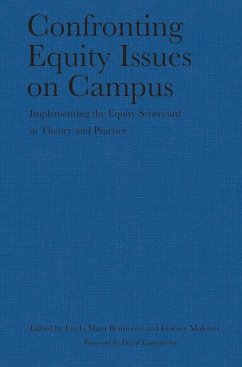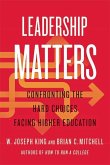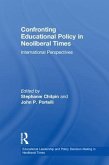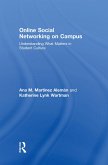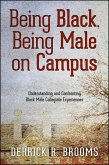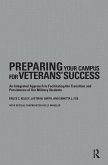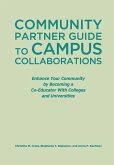Confronting Equity Issues on Campus
Implementing the Equity Scorecard in Theory and Practice
Herausgeber: Bensimon, Estela Mara; Malcom, Lindsey
Confronting Equity Issues on Campus
Implementing the Equity Scorecard in Theory and Practice
Herausgeber: Bensimon, Estela Mara; Malcom, Lindsey
- Gebundenes Buch
- Merkliste
- Auf die Merkliste
- Bewerten Bewerten
- Teilen
- Produkt teilen
- Produkterinnerung
- Produkterinnerung
Proponents of evidence-based decision-making seriously underestimate the complexity of transforming data into actionable knowledge. The Equity Scorecard, which has a proven track record as a powerful data tool for institutional change, and is the subject of this book, takes as its point of departure that institutional practitioners are in the best position to use data to close the racial gap in the main indicators of successful completion.
Andere Kunden interessierten sich auch für
![Reframing Campus Conflict Reframing Campus Conflict]() Reframing Campus Conflict179,99 €
Reframing Campus Conflict179,99 €![Leadership Matters: Confronting the Hard Choices Facing Higher Education Leadership Matters: Confronting the Hard Choices Facing Higher Education]() W. Joseph KingLeadership Matters: Confronting the Hard Choices Facing Higher Education38,99 €
W. Joseph KingLeadership Matters: Confronting the Hard Choices Facing Higher Education38,99 €![Confronting Educational Policy in Neoliberal Times Confronting Educational Policy in Neoliberal Times]() Confronting Educational Policy in Neoliberal Times179,99 €
Confronting Educational Policy in Neoliberal Times179,99 €![Online Social Networking on Campus Online Social Networking on Campus]() Ana M Martínez-AlemánOnline Social Networking on Campus211,99 €
Ana M Martínez-AlemánOnline Social Networking on Campus211,99 €![Being Black, Being Male on Campus: Understanding and Confronting Black Male Collegiate Experiences Being Black, Being Male on Campus: Understanding and Confronting Black Male Collegiate Experiences]() Derrick R. BroomsBeing Black, Being Male on Campus: Understanding and Confronting Black Male Collegiate Experiences101,99 €
Derrick R. BroomsBeing Black, Being Male on Campus: Understanding and Confronting Black Male Collegiate Experiences101,99 €![Preparing Your Campus for Veterans' Success Preparing Your Campus for Veterans' Success]() Bruce KelleyPreparing Your Campus for Veterans' Success179,99 €
Bruce KelleyPreparing Your Campus for Veterans' Success179,99 €![Community Partner Guide to Campus Collaborations Community Partner Guide to Campus Collaborations]() Christine M CressCommunity Partner Guide to Campus Collaborations179,99 €
Christine M CressCommunity Partner Guide to Campus Collaborations179,99 €-
-
-
Proponents of evidence-based decision-making seriously underestimate the complexity of transforming data into actionable knowledge. The Equity Scorecard, which has a proven track record as a powerful data tool for institutional change, and is the subject of this book, takes as its point of departure that institutional practitioners are in the best position to use data to close the racial gap in the main indicators of successful completion.
Produktdetails
- Produktdetails
- Verlag: Taylor & Francis
- Seitenzahl: 300
- Erscheinungstermin: 30. November 2011
- Englisch
- Abmessung: 231mm x 155mm x 25mm
- Gewicht: 454g
- ISBN-13: 9781579227074
- ISBN-10: 1579227074
- Artikelnr.: 33461388
- Verlag: Taylor & Francis
- Seitenzahl: 300
- Erscheinungstermin: 30. November 2011
- Englisch
- Abmessung: 231mm x 155mm x 25mm
- Gewicht: 454g
- ISBN-13: 9781579227074
- ISBN-10: 1579227074
- Artikelnr.: 33461388
Estela Mara Bensimon is a professor of higher education and co-director of the Center for Urban Education at the USC Rossier School of Education. Her current research is on issues of racial equity in higher education from the perspective of organizational learning and sociocultural practice theories. She is particularly interested in place-based, practitioner-driven inquiry as a means of organizational change in higher education. Dr. Bensimon has held the highest leadership positions in the Association for the Study of Higher Education (president, 2005-2006) and in the American Education Research Association-Division on Postsecondary Education (vice president, 1992-1994). She has served on the boards of the American Association for Higher Education and the Association of American Colleges and Universities. Dr. Bensimon was associate dean of the USC Rossier School of Education from 1996 to 2000 and was a Fulbright Scholar to Mexico in 2002. She earned her doctorate in higher education from Teachers College, Columbia University. Lindsey Malcom is an assistant professor of higher education administration in the Graduate School of Education and Human Development at the George Washington University. She received her bachelor's degree from the Massachusetts Institute of Technology, her master's degree from the California Institute of Technology, and her PhD in Education from the University of Southern California. Lindsey's scholarship focuses on broadening participation in science, technology, engineering, and mathematics fields.
Foreword-David Longanecker Introduction-Estela Mara Bensimon and Lindsey Malcom PART ONE. Theory
Organizational Learning
and Tools and Practices of the Equity Scorecard 1. The Equity Scorecard. Theory of Change-Estela Mara Bensimon 2. Scorecard Teams as High Learning Groups. Group Learning and the Value of Group Learning-Georgia L. Lorenz 3. The Equity Scorecard Process. Tools
Practices
and Methods-Estela Mara Bensimon PART TWO -- Practitioner Experiences of the Equity Scorecard 4. The Diversity Scorecard at Loyola Marymount University. An Exemplary Model of Dissemination-Abbie Robinson-Armstrong
Andrea Clemons
Matthew Fissinger
and Marshall Sauceda 5. Faculty Learning and Reflection from Student Interviews-Laura Palucki Blake
Edlyn Vallejo Peña
Diana Akiyama
Elizabeth Braker
Donna Kay Maeda
Michael A. McDonald
Gretchen North
John Swift
Michael Tamada
and Karen Yoshino 6. The Math Project at Los Angeles City College-Leticia Tomas Bustillos and Robert Rueda with Don Hentschel
Daryl Kinney
Janice Love
Iris Magee
Naeemah Payne
Hector Plotquin
& Roger Wolf 7. Evaluating the Equity Scorecard Project. The Participants' Points of View-Edlyn Vallejo Peña and Donald E. Polkinghorne PART THREE. Researcher Perspective. What We've Learned About Organizational Learning to Create Equity From the Equity Scorecard Process 8. An Activity-Based Approach to Promoting Equity in Community College Settings. Considering Process and Outcomes-Robert Rueda 9. Institutional Researchers as Teachers and Equity Advocates. Facilitating Organizational Learning and Change-Alicia C. Dowd
Lindsey Malcom
Jonathan Nakamoto
Estela Mara Bensimon 10. The Mediational Means of Enacting Equity-Mindedness among Community College Practitioners-Estela Mara Bensimon and Frank Harris III 11. The Equity Scorecard. Chronicling the Change Process-Edlyn Vallejo Peña
Frank Harris III
and Estela Mara Bensimon 12. Reflections from the Field-Georgia Lorenz Contributors Index
Organizational Learning
and Tools and Practices of the Equity Scorecard 1. The Equity Scorecard. Theory of Change-Estela Mara Bensimon 2. Scorecard Teams as High Learning Groups. Group Learning and the Value of Group Learning-Georgia L. Lorenz 3. The Equity Scorecard Process. Tools
Practices
and Methods-Estela Mara Bensimon PART TWO -- Practitioner Experiences of the Equity Scorecard 4. The Diversity Scorecard at Loyola Marymount University. An Exemplary Model of Dissemination-Abbie Robinson-Armstrong
Andrea Clemons
Matthew Fissinger
and Marshall Sauceda 5. Faculty Learning and Reflection from Student Interviews-Laura Palucki Blake
Edlyn Vallejo Peña
Diana Akiyama
Elizabeth Braker
Donna Kay Maeda
Michael A. McDonald
Gretchen North
John Swift
Michael Tamada
and Karen Yoshino 6. The Math Project at Los Angeles City College-Leticia Tomas Bustillos and Robert Rueda with Don Hentschel
Daryl Kinney
Janice Love
Iris Magee
Naeemah Payne
Hector Plotquin
& Roger Wolf 7. Evaluating the Equity Scorecard Project. The Participants' Points of View-Edlyn Vallejo Peña and Donald E. Polkinghorne PART THREE. Researcher Perspective. What We've Learned About Organizational Learning to Create Equity From the Equity Scorecard Process 8. An Activity-Based Approach to Promoting Equity in Community College Settings. Considering Process and Outcomes-Robert Rueda 9. Institutional Researchers as Teachers and Equity Advocates. Facilitating Organizational Learning and Change-Alicia C. Dowd
Lindsey Malcom
Jonathan Nakamoto
Estela Mara Bensimon 10. The Mediational Means of Enacting Equity-Mindedness among Community College Practitioners-Estela Mara Bensimon and Frank Harris III 11. The Equity Scorecard. Chronicling the Change Process-Edlyn Vallejo Peña
Frank Harris III
and Estela Mara Bensimon 12. Reflections from the Field-Georgia Lorenz Contributors Index
Foreword-David Longanecker Introduction-Estela Mara Bensimon and Lindsey Malcom PART ONE. Theory
Organizational Learning
and Tools and Practices of the Equity Scorecard 1. The Equity Scorecard. Theory of Change-Estela Mara Bensimon 2. Scorecard Teams as High Learning Groups. Group Learning and the Value of Group Learning-Georgia L. Lorenz 3. The Equity Scorecard Process. Tools
Practices
and Methods-Estela Mara Bensimon PART TWO -- Practitioner Experiences of the Equity Scorecard 4. The Diversity Scorecard at Loyola Marymount University. An Exemplary Model of Dissemination-Abbie Robinson-Armstrong
Andrea Clemons
Matthew Fissinger
and Marshall Sauceda 5. Faculty Learning and Reflection from Student Interviews-Laura Palucki Blake
Edlyn Vallejo Peña
Diana Akiyama
Elizabeth Braker
Donna Kay Maeda
Michael A. McDonald
Gretchen North
John Swift
Michael Tamada
and Karen Yoshino 6. The Math Project at Los Angeles City College-Leticia Tomas Bustillos and Robert Rueda with Don Hentschel
Daryl Kinney
Janice Love
Iris Magee
Naeemah Payne
Hector Plotquin
& Roger Wolf 7. Evaluating the Equity Scorecard Project. The Participants' Points of View-Edlyn Vallejo Peña and Donald E. Polkinghorne PART THREE. Researcher Perspective. What We've Learned About Organizational Learning to Create Equity From the Equity Scorecard Process 8. An Activity-Based Approach to Promoting Equity in Community College Settings. Considering Process and Outcomes-Robert Rueda 9. Institutional Researchers as Teachers and Equity Advocates. Facilitating Organizational Learning and Change-Alicia C. Dowd
Lindsey Malcom
Jonathan Nakamoto
Estela Mara Bensimon 10. The Mediational Means of Enacting Equity-Mindedness among Community College Practitioners-Estela Mara Bensimon and Frank Harris III 11. The Equity Scorecard. Chronicling the Change Process-Edlyn Vallejo Peña
Frank Harris III
and Estela Mara Bensimon 12. Reflections from the Field-Georgia Lorenz Contributors Index
Organizational Learning
and Tools and Practices of the Equity Scorecard 1. The Equity Scorecard. Theory of Change-Estela Mara Bensimon 2. Scorecard Teams as High Learning Groups. Group Learning and the Value of Group Learning-Georgia L. Lorenz 3. The Equity Scorecard Process. Tools
Practices
and Methods-Estela Mara Bensimon PART TWO -- Practitioner Experiences of the Equity Scorecard 4. The Diversity Scorecard at Loyola Marymount University. An Exemplary Model of Dissemination-Abbie Robinson-Armstrong
Andrea Clemons
Matthew Fissinger
and Marshall Sauceda 5. Faculty Learning and Reflection from Student Interviews-Laura Palucki Blake
Edlyn Vallejo Peña
Diana Akiyama
Elizabeth Braker
Donna Kay Maeda
Michael A. McDonald
Gretchen North
John Swift
Michael Tamada
and Karen Yoshino 6. The Math Project at Los Angeles City College-Leticia Tomas Bustillos and Robert Rueda with Don Hentschel
Daryl Kinney
Janice Love
Iris Magee
Naeemah Payne
Hector Plotquin
& Roger Wolf 7. Evaluating the Equity Scorecard Project. The Participants' Points of View-Edlyn Vallejo Peña and Donald E. Polkinghorne PART THREE. Researcher Perspective. What We've Learned About Organizational Learning to Create Equity From the Equity Scorecard Process 8. An Activity-Based Approach to Promoting Equity in Community College Settings. Considering Process and Outcomes-Robert Rueda 9. Institutional Researchers as Teachers and Equity Advocates. Facilitating Organizational Learning and Change-Alicia C. Dowd
Lindsey Malcom
Jonathan Nakamoto
Estela Mara Bensimon 10. The Mediational Means of Enacting Equity-Mindedness among Community College Practitioners-Estela Mara Bensimon and Frank Harris III 11. The Equity Scorecard. Chronicling the Change Process-Edlyn Vallejo Peña
Frank Harris III
and Estela Mara Bensimon 12. Reflections from the Field-Georgia Lorenz Contributors Index

